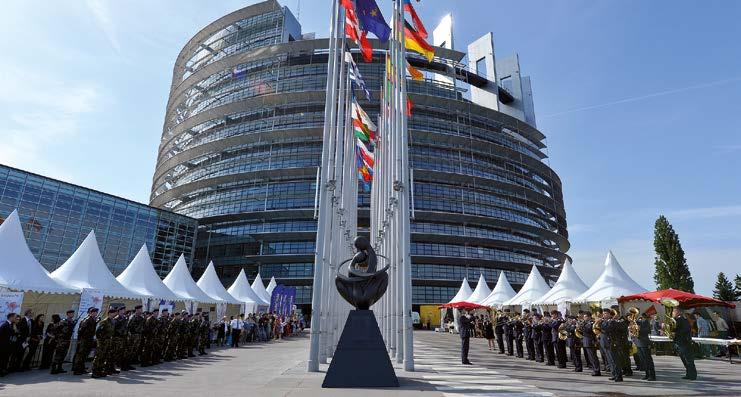European security and defence
The crucial role of the EDA in coordinating the race for capabilities Interview with Martin Konertz, Director Capabilities, Armament & Technology, EDA, Brussels The Bratislava European Summit, in September 2016, brought a new impetus and awareness that Europe must revitalise defence cooperation against the backdrop of increasing security challenges. Since then we have witnessed the emergence of several existing EU defence initiatives such as the Coordinated Annual Review on Defence (CARD) as part of the implementation of the new European Global Strategy, the establishment of the Permanent Structured Cooperation (PESCO) and the launch of the European Defence Fund (EDF) by the European Commission. But what role does the European Defence Agency (EDA) have to play to ensure coherence among them? Hartmut Bühl met with EDA Director Martin Konertz in Brussels to hear his perspective of the ongoing developments.
The European: Mr Konertz, you are one of the three Directors of the EDA, responsible for Capabilities, Armament & Technology (CAT). Could you describe your mission as the CAT Director? Martin Konertz: The Agency supports its Member States and the EU-Council in their efforts to improve European defence capabilities. One of the key tasks of the CAT Directorate is to generate collaborative projects related to capability development together with interested Member States. That also entails system related projects with a Research and Technology (R&T) background. One of the major objectives is to develop common staff targets and requirements as well as business cases for Member States who participate in the projects. This harmonisation of requirements is an essential part of collaborative capability development. The European: And with regards to the new EU defence initiative, PESCO? Martin Konertz: The CAT Directorate is responsible for contributing to the PESCO Secretariat, a new unit within the Directorate that runs the assessment of project proposals handed in
photo: © European Defence Agency
PESCO is not solely an initiative focused on capability projects
by PESCO Member States, as well as the annual assessment of their National Implementation Plans (NIPs). My task as CAT Director is to set the objectives for the units and coordinate their work. This entails overseeing that our products are developed in a cross-directorate manner. The European: What is the exact role of the newly created PESCO Secretariat? Martin Konertz: The PESCO Secretariat is composed of the European External Action Service, including the EU Military Staff (EUMS) and the EDA. It delivers secretariat functions to the High Representative/Vice President. As laid down in the Council Decision of December 2017, these functions mainly include the assessment of NIPs and PESCO project proposals. The EDA assesses them from a capability perspective, while the EUMS does the same from an operational viewpoint. Based on this assessment, the High Representative recommends PESCO projects to the Council for approval. The European: On what criteria are you working? Martin Konertz: The EDA and EUMS have developed transparent assessment criteria for the capability and operational perspectives respectively. The former is designed around the EU Capability Development Priorities (CDP) and the likely impact of the project proposals on the coherence of the European capability landscape. Moreover, the EDA is also looking to avoid duplication, be it in an EU or NATO context. The European: Since its very beginnings, the EDA has been striving to create a certain coherence of capabilities, standardisation of weapon systems and coordination of R&T. It seems only now that Member States are willing to create a “full spectrum force”. What will be the outcome? Martin Konertz: The EDA plays an important role in the implementation of PESCO. Let me recall two important aspects. Firstly, the real power and value of PESCO lie in the 20 more binding commitments which could be seen as the basic plan to implement it. Its Member States committed themselves to report back through NIPs. Thereby PESCO becomes a tool and an obligation for Member States to take defence cooperation to
53

















